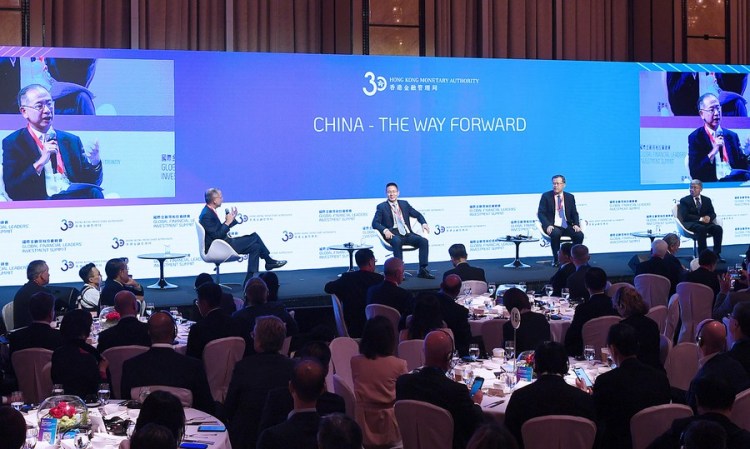 Bridging News
Bridging News
Global Financial Institutions Jump at Chance to Boost China Presence
* Many global financial institutions have been briskly stepping up investments and increasing their presence in China this year.
* China has been intensifying moves to promote a high level of financial opening up in recent years.
* The steady institutional opening up in the financial sector will continue to facilitate cross-border investment and financing and attract more foreign investors and long-term capital.
Beijing - Many global financial institutions have been briskly stepping up investments and increasing their presence in China this year, as the country's brightened economic outlook and steady opening up are offering more opportunities, despite a sluggish global economy.
Standard Chartered Bank (Hong Kong) Ltd. got the nod to set up a securities firm in the Chinese mainland early this year.
With an initial capital injection of 1.05 billion yuan (about 147.36 million U.S. dollars), the new company became the first newly-approved wholly foreign-owned securities firm since China lifted foreign ownership caps in the sector in 2020.
"We are firmly optimistic about China's medium- and long-term development prospects and look forward to the broad opportunities brought about by China's continuous opening up," said Zhang Xiaolei, executive vice chairman and chief executive officer (CEO) of Standard Chartered Bank (China) Ltd.
Standard Chartered is not the only foreign institution vying to explore new opportunities in the Chinese stock market.
The China Securities Regulatory Commission has green-lighted the establishment of seven foreign-controlled or wholly foreign-owned securities, futures and fund companies this year. The combined figure since 2020 has grown to 20.

This photo taken on Nov. 7, 2023 shows a scene of the main session of the Global Financial Leaders' Investment Summit in Hong Kong, south China. (Photo/Chen Duo, Xinhua)
In terms of the banking sector, Mastercard's Chinese joint venture was recently allowed to conduct bank card clearing operations. Mastercard NetsUnion Information Technology (Beijing) Co., Ltd. can authorize its member institutions to issue Mastercard yuan bank cards in China.
This approval made Mastercard the second overseas bank card clearing institution to enter the Chinese market after American Express in 2020.
"China is one of our most important markets. We are pleased to have reached this milestone," said Michael Miebach, CEO of Mastercard, adding that Mastercard's deeper participation in the Chinese market will benefit the country, its consumers and its businesses.
Official data showed that in the first three quarters of this year, capital injection or increase by foreign-funded banks in China amounted to the equivalent of 1.96 billion yuan. Meanwhile, two banks set up new branches and six put new business outlets into use.
China has been intensifying moves to promote a high level of financial opening up in recent years, with more than 50 specific measures introduced, including allowing global investors to invest in China's capital market through more channels and scrapping ownership caps for foreign institutions for securities, futures and funds.
Lured by these concrete opening up steps, many global financial institutions expanded their footprints in China.

Jose Vinals, chairman of Standard Chartered Group, delivers a speech at the Belt and Road CEO Conference in Beijing, capital of China, Oct. 17, 2023. (Photo/Chen Bin, Xinhua)
Standard Chartered's Zhang described China as the bank's "most important strategic market," while adding that "the Chinese market has been the largest contributor to Standard Chartered's global network revenue for many years, which proves the effectiveness of our China strategy."
In the first three quarters of 2023, Standard Chartered's China onshore and offshore pre-tax profit increased about three-fold year on year, reaching 1 billion U.S. dollars.
This U.K.-based multinational bank has committed to investing 300 million U.S. dollars in its China-related businesses from 2022 to 2024, including digitalization, renminbi's internationalization, and wealth management.
Meanwhile, betting on the potential of the Chinese market, HSBC plans to pump more than 3 billion yuan into its China operations over a five-year period running until 2025.
In October, HSBC agreed to buy Citigroup's retail wealth management portfolio in the Chinese mainland. Wang Yunfeng, president and CEO of HSBC Bank (China) Company Ltd., said the deal demonstrated HSBC's firm commitment to the Chinese market.
HSBC raked in more than 6 billion yuan in net profits in China last year, surging 54 percent from 2021.
As for the Bank of East Asia (China) Ltd., its business in China's vibrant Guangdong-Hong Kong-Macao Greater Bay Area has become an important growth driver.
Ho Shun-wah, executive director and chief executive of BEA China, expressed strong confidence in the Chinese markets and said the bank will boost new loans in China next year to better serve the real economy.

This aerial photo taken on Sept. 10, 2023 shows a view of Zhangjiang area of the China (Shanghai) Pilot Free Trade Zone in east China's Shanghai. (Photo/Fang Zhe, Xinhua)
Analysts believe that this stronger China push on the part of foreign-funded financial institutions in essence confirms widespread optimism about China's economic prospects.
With China's third-quarter performance surpassing market expectations, a number of international institutions have upgraded their China growth predictions.
China's real gross domestic product (GDP) is projected to grow by 5.4 percent in 2023, a recent International Monetary Fund (IMF) statement said.
"The Chinese economy is on track to meet the government's 2023 growth target, reflecting a strong post-COVID recovery," read the statement issued by the IMF's First Deputy Managing Director, Gita Gopinath, following a visit to China.
The UBS also raised its forecast for China's GDP growth in 2023 to 5.2 percent from its previous 4.8 percent prediction, while Deutsche Bank, Nomura and J.P. Morgan have all raised their China full-year GDP growth forecasts.
Early this week, a meeting of the country's Central Financial Commission highlighted work to steadily promote the opening up of the financial sector, as well as its development and growth. Observers said the country's steady institutional opening up in the financial sector will continue to facilitate cross-border investment and financing and attract more foreign investors and long-term capital.
China's financial opening up will never stop, and its determination to share development opportunities with the rest of the world will never change, said Li Yunze, head of the National Financial Regulatory Administration.
Li pledged efforts to further expand the market access of foreign institutions, make the financial system and policies more transparent, stable and predictable, and create an institutional environment conducive to prudent operation and fair competition.
 Related Stories
Related Stories